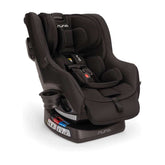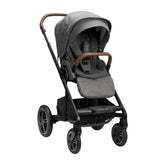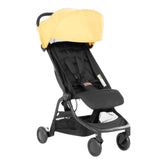How to Avoid 5 Toxic Chemicals in Everyday Baby Products

Updated: 18 Dec 2024
Avoiding toxic chemicals is critical when it comes to guarding our children. Because their little bodies are still growing and changing, children are particularly vulnerable to a toxin’s dangerous side effects. Even minute exposure during important developmental windows can lead to future infertility, cancers, learning disabilities, and other severe health issues later on.
Ingredients to Avoid in Baby Products: Common Toxic Chemicals
Fortunately, there are simple things you can do to minimize your child’s risk when it comes to toxic chemical exposure. Start today by avoiding five of the most toxic chemicals found in everyday baby products.
1. Phthalates
Where You’ll Find Them: in plastics (especially those that come into contact with food) and in perfumes added to hygiene products
The Problem: Phthalates are used as a plastic softener. They are also a type of chemical used in fragrance. They do not emit a scent on their own, as musks or plant essences do. Instead, they act as a carrier agent for other chemicals that create the scent in a fragrance. Phthalates are known to induce reproductive and developmental harm in laboratory animals and are connected to similar impacts in humans. Human studies have also linked prenatal exposure to some phthalates with altered neurodevelopment in children.
The Solution: Opt for organic or fragrance-free hygiene and cleaning products. Buy pacifiers and baby bottle nipples constructed from hospital-grade silicon. Avoid plastic food containers when possible.
Bath time is a good time with this tear-free Burt's Bees Shampoo and Wash. The gentle, plant-based formula will naturally cleanse your baby's soft skin from head to tiny toe so there's no fussing—just fun. Clinically proven to be safe and effective for daily use, this baby bath essential is formulated without phthalates, parabens, petrolatum, or SLS.

2. BPA and BPA Substitutes
Where You’ll Find Them: Sippy cups, baby bottles, and other plastic food containers; certain canned food liners
The Problem: In 2012 the U.S. Food and Drug Administration prohibited the sale of baby bottles that have bisphenol A (BPA), a compound often found in plastics. The ban came after manufacturers responded to consumer worries regarding BPA's safety after several studies found the chemical mimics estrogen and could harm the brain and reproductive development in fetuses, infants, and children. Since then, BPA-free bottles for babies and adults alike have been readily available on store shelves. Yet, current research reveals that a common BPA substitute, bisphenol S (BPS), could be just as dangerous. Other studies suggest that nearly all plastics have estrogenic activity and could potentially leech hormone-disrupting chemicals.
The Solution: Use stainless steel and glass food and beverage vessels when possible. Don’t reuse single-use plastic food and beverage containers. Avoid putting any plastic containers in the dishwasher or microwave since the high temperatures can cause toxins to leech.
FRIGG natural rubber pacifiers have been thoughtfully designed for your baby's comfort. The outward curve keeps the pacifier off their delicate skin, while features like air holes and a security handle ensure your baby stays safe. The pacifier nipple is made from 100% natural rubber. It’s also 100% free from BPA, PVC, and phthalates.

FRIGG natural rubber pacifiers
3. High-Risk Pesticides
Where You’ll Find Them: Soaps and disinfectant cleaners, insect repellents, residue in conventionally grown produce
The Problem: According to the Pesticide Action Network, research shows that children exposed to pesticides either in utero or during other crucial developmental periods may have reduced IQs, birth defects and developmental delays, and face an increased risk of autism spectrum disorder, ADHD, and cancer. The American Academy of Pediatricians (AAP) has also recognized that the lower pesticide residues in organic foods may be significant for children.
The Solution: Choose organic food when possible. Minimize usage of disinfecting soaps and cleaners. Select regular soap for daily use. Opt for insect repellents that don’t contain harmful pesticides.
Zoey Naturals entire line of family products is free of harsh chemicals and gentle on the environment. Zoey Naturals Island Hibiscus Hand Sanitizer effectively kills 99.9% of germs and bacteria. It has been formulated without the use of harsh chemicals and deeply cleanses without the use of water.

Zoey Naturals Island Hibiscus Hand Sanitizer
4. Formaldehyde and Formaldehyde Releasers
Where You’ll Find It: Baby hygiene products, like soap
The Problem: According to the National Toxicology Program, formaldehyde is a well-documented known human carcinogen. It is sometimes added directly to hygiene products, or it may be discharged in incremental amounts from other chemicals over time.
The Solution: MadeSafe recommends reading product ingredient lists to avoid the following chemicals: formaldehyde, quaternium-15, DMDM hydantoin, imidazolidinyl urea, diazolidinyl urea, polyoxymethylene urea, sodium hydroxymethylglycinate, 2-bromo-2-nitropropane-1,3-diol (bromopol) and glyoxal.
Zoey Naturals entire line of family products is free of harsh chemicals and gentle on the environment. Zoey Naturals Soothing Lavender Head to Toe Wash gently cleanses skin and hair.

Zoey Naturals Soothing Lavender Head to Toe Wash
5. Flame Retardants
Where You’ll Find Them: bedding, car seats, products containing foam, such as nap mats and nursing pillows
The Problem: According to the Green Science Policy Institute (GSP), a recent study showed more than a third of the baby products tested (baby strollers, changing pads, car seats, nursing pillows, etc), contained a flame retardant known as TDCPP, or Chlorinated Tris, at levels up to 12% of the weight of the foam in the products. According to the Consumer Product Safety Commission (CPSC), Chlorinated Tris is a probable human carcinogen. Studies have shown links between increased flame retardant body levels and lower IQ in children, endocrine and thyroid disruption, alterations in male hormone levels, decreased fertility, unfavorable birth outcomes, and impaired development. The kicker? Studies show the addition of these chemicals to baby gear does not provide a proven fire safety benefit and is therefore unnecessary.
The Solution: Avoid baby products containing foam when possible. Opt for 100% wool or cotton bedding. You can also place a wool or cotton cover on a regular mattress to reduce exposure.
The Snuggle Me Organic Feeding Pillow is designed to fit you and your baby’s unique feeding needs. Crafted with organic cotton, non-toxic, breathable, and hypoallergenic fabrics. Filled with polyester fiberfill for a fully machine-washable pillow.

Snuggle Me Organic Feeding Pillow
ANB Baby offers a wide range of popular brands that care about the safety of your little one. Take a look!









